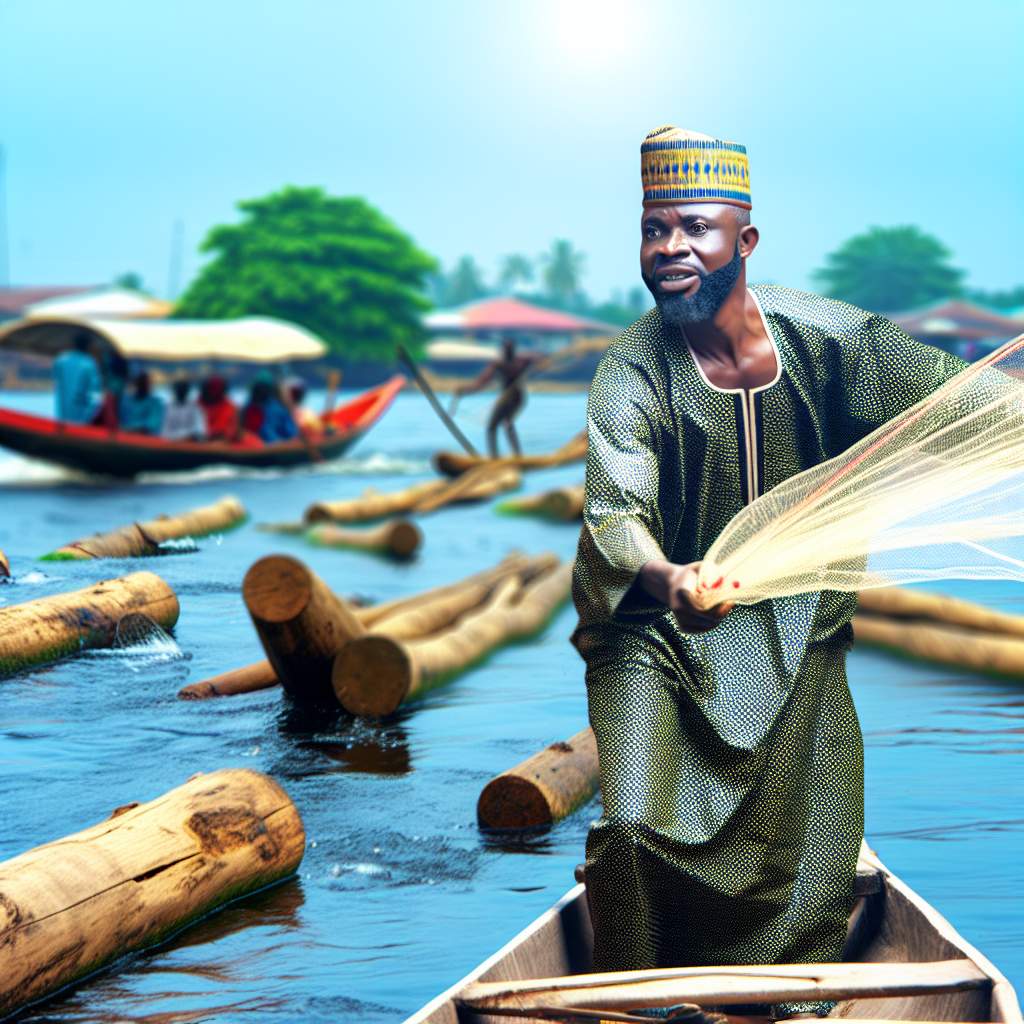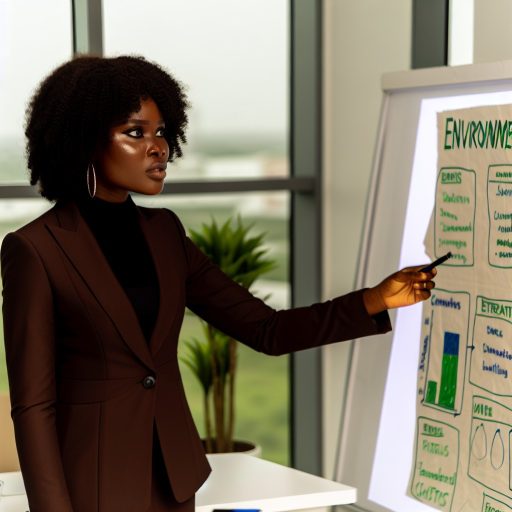Fisheries play a vital role in Nigeria’s economy.
They provide employment and a key source of protein for the population.
This topic is crucial as it addresses the challenges that threaten the sustainability of fisheries in Nigeria.
Overfishing
One major challenge facing fisheries in Nigeria is overfishing.
Fish populations are depleted faster than they can reproduce.
Illegal Fishing Practices
Another challenge is illegal fishing practices.
This includes using banned fishing equipment or fishing in restricted areas.
These practices disrupt ecosystems.
Pollution
Pollution poses a threat to fisheries in Nigeria.
This is due to both industrial sources and agricultural runoff.
It contaminates water bodies and harms fish populations.
Lack of Regulation
The absence of strict regulations in the fishing industry is concerning.
This leads to unsustainable practices and overexploitation of fish stocks.
Climate Change Impacts
Climate change affects fisheries in multiple ways.
Rising sea temperatures and ocean acidification alter fish habitats.
These changes affect fish populations and migration patterns.
Infrastructure Challenges
Poor infrastructure hinders efficient transportation of fish products.
This includes inadequate storage facilities and ports in Nigeria.
Importance of Sustainable Fisheries
Addressing these challenges is essential for sustainability.
Ensuring the long-term health of fisheries is vital for Nigeria’s economy.
Lack of modern equipment and technology in fishing:
Outdated and inefficient fishing methods persist in Nigeria.
Nigerian fishermen still rely on traditional methods such as handlines, fish traps, and gill nets.
These methods are not only labor-intensive but also result in a lower catch rate compared to modern techniques.
The use of outdated equipment makes it difficult for fishermen to compete in the global market.
Impact on the quality and quantity of fish caught is significant.
Due to the use of traditional methods, the quality of fish caught may deteriorate over time.
Modern equipment such as trawlers and fish finders can help improve the efficiency of fishing operations.
Without access to modern technology, Nigerian fishermen struggle to meet the growing demand for fish in the country.
Challenges Facing Fisheries in Nigeria
When it comes to the challenges facing fisheries in Nigeria, pollution of water bodies is a significant issue that cannot be overlooked.
Pollution poses a serious threat to fish populations and has far-reaching consequences on the entire ecosystem.
Impact of pollution on fish populations
- Pollution leads to a decrease in the availability of oxygen in water, which can suffocate fish and other aquatic organisms.
- Toxic substances in polluted water can contaminate fish, making them unsafe for human consumption.
- The disruption of aquatic habitats due to pollution can result in a decline in fish abundance and diversity.
- Polluted water bodies are more prone to diseases, which can spread among fish populations and cause mass mortality.
Sources of pollution in Nigeria
- Oil spills from pipelines and offshore oil exploration activities contaminate water bodies in the Niger Delta region.
- Industrial activities release chemical pollutants and heavy metals into rivers and coastal waters, affecting fish habitats.
- Improper disposal of waste, including plastic pollution, leads to the degradation of water quality and impacts fish health.
- Agricultural runoff containing fertilizers and pesticides pollutes freshwater systems, affecting fish reproduction and survival.
Addressing pollution in Nigerian water bodies is crucial to ensuring the sustainability of fisheries and protecting the livelihoods of fisherfolks.
Implementing strict environmental regulations, promoting sustainable fishing practices, and raising awareness about the importance of clean water are essential steps towards safeguarding the future of fisheries in Nigeria.
You Might Also Like: Innovations in Nigeria’s Environmental Technology
Overfishing and Depletion of Fish Stocks:
Overfishing in Nigeria is a common practice due to a variety of reasons.
These reasons include lack of fishery management regulations.
Additionally, the use of illegal fishing methods contributes to the issue.
Increasing demand for fish drives overfishing practices.
Unsustainable practices deplete fish populations beyond their reproductive capacity.
This decline leads to a significant drop in fish stocks.
Consequences of Depleting Fish Stocks for the Environment and Economy:
- Environmental consequences:
- Depletion of fish stocks can disrupt the marine ecosystem.
- This disruption affects the balance of species.
- It may lead to loss of biodiversity.
- Cascading effects on other species dependent on fish for food occur.
- Overfishing can also damage vital habitats.
- Coral reefs and seagrass beds are essential for fish survival.
- Destruction of these habitats results in long-term environmental damage.
- Economic consequences:
- Depletion impacts local communities dependent on fishing for livelihood.
- As fish populations decline, fishing communities may see decreased catch.
- This leads to reduced income and food security.
- Furthermore, overfishing can result in the collapse of fisheries.
- Job losses and economic hardship occur in the fishing industry.
- These effects ripple into other sectors that rely on fisheries for employment.
Overfishing and depletion of fish stocks pose serious challenges to the environment in Nigeria.
Transform Your Career with Expert Guidance
Get personalized mentorship consulting that’s tailored to your unique path. Our expert advice is actionable and exclusive.
Get StartedAddressing these issues requires effective management practices.
Furthermore, enforcement of regulations is crucial.
Cooperation among stakeholders is necessary for sustainability.
We must ensure the sustainability of fisheries for future generations.
Gain More Insights: Challenges in Environmental Management Tech in Nigeria
One of the major challenges facing fisheries in Nigeria is the inadequate infrastructure and storage facilities.
This issue poses a significant obstacle to the efficient transportation and proper storage of fish.
Ultimately, this affects the quality and marketability of Nigerian fish.
Challenges in transporting fish
- Poor road networks: Many fishing communities in Nigeria are located in remote areas with limited access to good roads, making it difficult to transport fish to markets.
- Lack of cold chain facilities: The absence of refrigerated trucks and storage facilities hinders the transportation of fish over long distances without compromising their quality.
- Inadequate packaging materials: Improper packaging can lead to spoilage and contamination of fish during transit, reducing its appeal to consumers.
Challenges in storing fish
- Lack of proper storage facilities: Fishermen often struggle to find suitable storage options, leading to spoilage and wastage of their catch.
- Inadequate preservation methods: Without access to modern preservation techniques such as refrigeration or freezing, fish may not retain its freshness for long periods.
- Poor handling practices: Improper handling of fish during storage can result in damage, affecting the overall quality and market value of the product.
Addressing these issues is crucial for improving the quality of Nigerian fish and enhancing its marketability both locally and internationally.
You Might Also Like: How to Start a Career in Environmental Safety
Lack of government support and funding:
The insufficient investments in the fisheries sector have hindered its growth and development.
Without adequate funding, the industry struggles to modernize equipment and improve infrastructure.
Policy interventions are crucial to address issues such as overfishing and environmental degradation.
Government support is needed to implement sustainable fishing practices and ensure the preservation of marine resources.
Financial assistance can help small-scale fishers access better tools and technologies for increased productivity.
Lack of funding has also led to a lack of research and development in the fisheries sector.
Government intervention is necessary to provide training and education for fisherfolk to improve their skills.
Without financial support, the industry faces challenges in meeting standards and regulations for exportation.
Investment in the fisheries sector can boost economic growth and create employment opportunities for local communities.
It is essential for the government to allocate sufficient funds to support the sustainability and growth of the fisheries sector.
Uncover the Details: Nigeria’s Efforts in Combating Deforestation

Climate change and its impact on fisheries:
Climate change affects fish habitats and breeding patterns by altering water temperature and acidity.
Rising sea levels and extreme weather events can disrupt fish migration patterns.
Changes in ocean currents and temperatures can lead to the decline of certain fish populations.
Measures needed to adapt to changing environmental conditions:
- Implementing sustainable fishing practices to reduce pressure on fish stocks.
- Investing in research and technology to monitor and predict changes in fish populations.
- Encouraging the use of alternative fishing methods that are more environmentally friendly.
- Promoting the establishment of marine protected areas to conserve fish habitats.
- Collaborating with other countries to address transboundary issues related to climate change and fisheries.
- Educating fishermen and communities on the importance of adapting to changing environmental conditions.
- Implementing policies and regulations that promote the sustainable management of fisheries in the face of climate change.
Addressing the challenges of climate change on fisheries in Nigeria requires a multifaceted approach.
This approach involves cooperation between government agencies, fishermen, researchers, and local communities.
By implementing measures to adapt to changing environmental conditions, it is possible to ensure the long-term sustainability of the fisheries sector in Nigeria.
One of the major challenges facing fisheries in Nigeria is inefficient fish processing and marketing.
This issue undermines the overall value chain of the industry and hampers profitability.
In this section, we will delve into the problems associated with fish processing and marketing in Nigeria.
We will also suggest ways to improve the value chain and increase profitability.
Problems with Fish Processing and Marketing in Nigeria
- Lack of modern processing facilities: Many fish processing facilities in Nigeria are outdated and inefficient, leading to poor quality products.
- Poor storage facilities: Inadequate storage facilities result in post-harvest losses and reduced shelf life of fish products.
- Lack of proper packaging and branding: Nigerian fish products often lack attractive packaging and branding, making them less competitive in the market.
- Inconsistent quality standards: There is a lack of consistent quality standards for fish products, leading to consumer distrust and variable market prices.
- Efficient distribution networks: The distribution of fish products in Nigeria is often unreliable and costly, affecting market penetration and profitability.
Ways to Improve the Value Chain and Increase Profitability
- Invest in modern processing facilities: The government and private sector should invest in modern fish processing facilities to improve product quality and efficiency.
- Enhance storage facilities: Building proper storage facilities will help reduce post-harvest losses and increase the shelf life of fish products.
- Improve packaging and branding: Enhancing the packaging and branding of fish products will make them more appealing to consumers and increase market competitiveness.
- Establish quality standards: Implementing and enforcing consistent quality standards for fish products will build consumer trust and stabilize market prices.
- Optimize distribution networks: Streamlining distribution networks will improve market access, reduce costs, and increase profitability for fish producers.
By addressing the inefficiencies in fish processing and marketing in Nigeria and implementing the suggested strategies, the fisheries industry can overcome these challenges.
Moreover, it can thrive in the global market.
Challenges Facing Fisheries in Nigeria
One major challenge facing fisheries in Nigeria is overfishing, leading to a decline in fish stocks.
Illegal, unreported, and unregulated fishing practices are rampant, further depleting fish populations.
Poor fishing infrastructure and lack of modern technology hinder efficiency and productivity in the industry.
Climate change impacts, such as rising sea temperatures and extreme weather events, disrupt fishing activities.
Pollution from oil spills and industrial waste contaminates water bodies, affecting fish health and quality.
Insufficient enforcement of fishing regulations allows for unsustainable practices to persist unchecked.
Urgent Call for Action
The challenges facing fisheries in Nigeria are multifaceted and require urgent attention.
It is imperative for stakeholders to come together to address these issues and promote sustainable fishing practices.
Additional Resources
The impact of flooding on Nigeria’s sustainable development goals …
Systematic review of climate change impact research in Nigeria …




